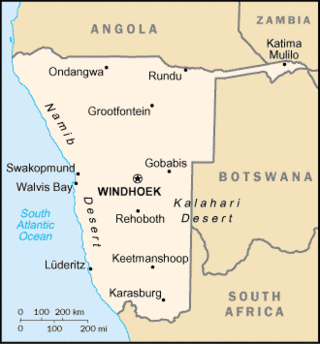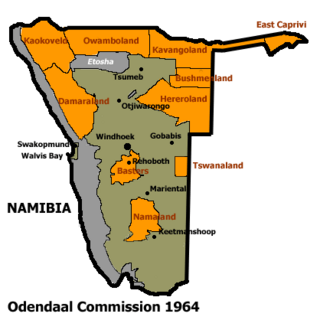
A United Nations resolution is a formal text adopted by a United Nations (UN) body. Although any UN body can issue resolutions, in practice most resolutions are issued by the Security Council or the General Assembly.

United Nations Commissioner for South West Africa was a post created by the United Nations General Assembly (UNGA) in 1966 to assert the UN's direct responsibility for South West Africa which was then under illegal occupation by apartheid South Africa.
United Nations Security Council Resolution 264 was adopted on March 20, 1969, after a General Assembly resolution terminated the mandate of South West Africa (Namibia).
United Nations Security Council Resolution 283 was a United Nations Security Council resolution adopted July 29, 1970. It was adopted by 13 votes to none, with France and the United Kingdom abstaining.
United Nations Security Council Resolution 284, adopted on July 29, 1970, submitted the following question to the International Court of Justice for an advisory opinion: "What are the legal consequences for States of the continued presence of South Africa in Namibia notwithstanding Security Council resolution 276 (1970)?". The Council requested the Secretary-General to transmit the resolution, along with all documents likely to throw light upon to the question to the Court.

United Nations Security Council Resolution 301, adopted on October 20, 1971, after reaffirming previous resolutions on the topic, the Council condemned the Bantustans, which they described as moves designed to destroy unity and territorial integrity along with South Africa's continued illegal presence in Namibia, then known as South West Africa.
United Nations Security Council Resolution 310, adopted on February 4, 1972, after reaffirming previous resolutions on the topic, the Council strongly condemned repressive measures against the African laborers in Namibia and called upon all nations and corporations operating in Namibia to use whatever means available to ensure that operations there conform to the Universal Declaration of Human Rights.
United Nations Security Council Resolution 333, adopted on May 22, 1973, after reiterating previous statements and admitting that previous measures had yet failed to bring about the end of the "illegal regime in Southern Rhodesia" the Council condemned South Africa and Portugal for failing to co-operate with the implementation of sanctions and requested that urgent action be taken to implement them. The Council then requested that states with legislation permitting importation from Rhodesia repeal it immediately and called upon states to enact and enforce legislation against any person who tries to evade of commit a breach of sanctions by:
United Nations Security Council Resolution 342, adopted unanimously on December 11, 1973, after noting with appreciation a report by the Secretary-General, the Council decided to discontinue further efforts on the basis of resolution 309 and requested the Secretary-General keep them informed of any new developments concerning the question of Namibia.

United Nations Security Council resolution 447, adopted on 28 March 1979, after hearing representations from the People's Republic of Angola and the South West Africa People's Organisation (SWAPO), the Council recalled resolutions 387 (1976) and 428 (1978) and condemned South Africa for its continuing raids in direct violation of prior resolutions.

United Nations Security Council resolution 475, adopted on 27 June 1980, after hearing representations from the People's Republic of Angola, the Council recalled resolutions 387 (1976), 447 (1979) and 454 (1979), and expressed its concern and condemned the continuing attacks on the country by South Africa through occupied South West Africa.

United Nations Security Council resolution 539, adopted on 28 October 1983, after hearing a report from the Secretary-General and reaffirming resolutions 301 (1971), 385 (1976), 431 (1978), 432 (1978), 435 (1978), 439 (1978) and 532 (1983), the council condemned South Africa's continued occupation of Namibia, then known as South West Africa, and the tension and instability prevailing in southern Africa as a result.

United Nations Security Council resolution 566, adopted on 19 June 1985, after recalling resolutions 269 (1969), 276 (1970), 301 (1971), 385 (1976), 431 (1978), 432 (1978), 435 (1978), 439 (1978), 532 (1983) and 539 (1983), the Council expressed concern at the tension and instability caused the continued occupation of Namibia by South Africa, noting the apartheid policies implemented in the territory and that the territory was used as a springboard for attacks on other southern African countries.

United Nations Security Council resolution 601, adopted on 30 October 1987, after recalling resolutions 269 (1969), 276 (1970), 301 (1971), 385 (1976), 431 (1978), 432 (1978), 435 (1978), 439 (1978), 532 (1983), 539 (1983) and 566 (1985), the council again condemned South Africa for its continued "illegal" occupation of Namibia and its refusal to comply with previous resolutions.

United Nations Security Council resolution 629, adopted unanimously on 16 January 1989, after recalling resolutions 431 (1978), 435 (1978) and 628 (1989), the council noted that the parties to the Brazzaville Protocol agreed that 1 April 1989 be established as the date of the South African withdrawal from Angola and therefore lead the way to the independence of Namibia.

United Nations Security Council resolution 632, adopted unanimously on 16 February 1989, after reaffirming resolutions 431 (1978), 435 (1978) and 629 (1989), the Council endorsed a report by the Secretary-General Javier Pérez de Cuéllar concerning the United Nations plan for Namibia, reiterating its legal authority over the territory until its independence.

United Nations Security Council resolution 640, adopted unanimously on 29 August 1989, after reaffirming resolutions 431 (1978), 435 (1978), 629 (1989) and 632 (1989), the Council reminded all parties involved in the situation in Namibia implement Resolution 435 of 29 September 1978.

United Nations Security Council resolution 643, adopted unanimously on 31 October 1989, after reaffirming resolutions 435 (1978) and 629 (1989), 632 (1989) and 640 (1989), as well as noting a report by the Secretary-General Javier Pérez de Cuéllar, the council expressed its full intention to implement Resolution 435 of 29 September 1978 regarding the situation in Namibia.
United Nations Security Council resolution 1390, adopted unanimously on 16 January 2002, after recalling resolutions 1267 (1999), 1333 (2000), 1363 (2001), 1368 (2001), 1373 (2001) 1378 (2001) and 1383 (2001) concerning the situation in Afghanistan and terrorism, the Council imposed further sanctions on Osama bin Laden, Al-Qaeda, the Taliban and others associated with them.
The “Namibia exception” identifies the Advisory opinion issued on 21 June 1971 by the International Court of Justice (I.C.J), the principal judicial organ of the United Nations (UN). The opinion refers to the "Legal Consequences for States of the Continued Presence of South Africa in Namibia notwithstanding Security Council Resolution 276 (1970)".




